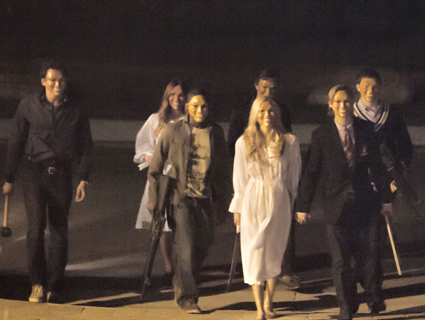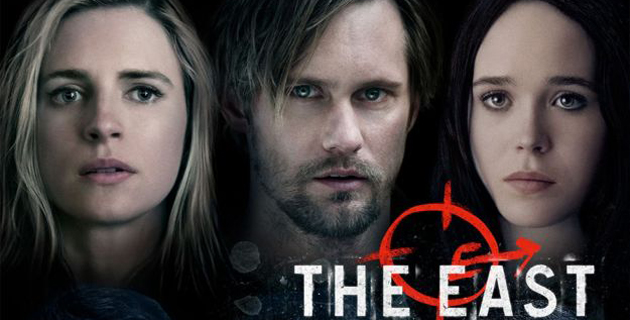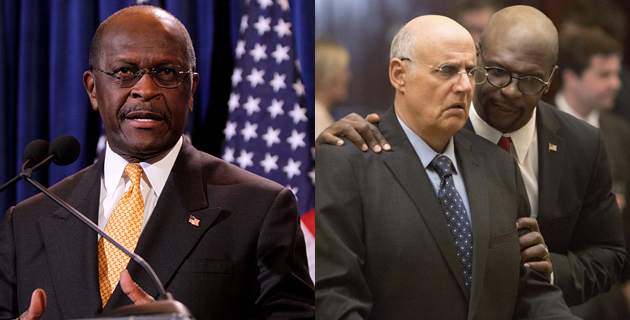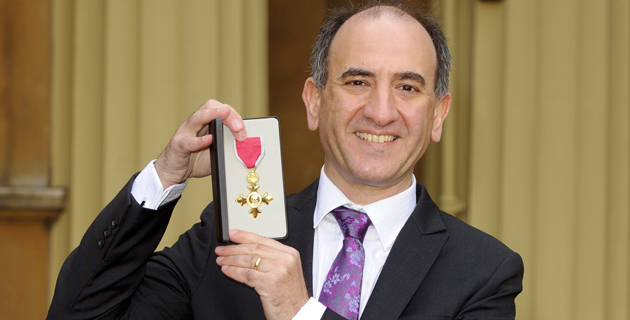
Armando Iannucci, with his Order of the British Empire medal at Buckingham Palace.Jonathan Hordle/Rex Features/UPPA/ZUMA Press
Armando Iannucci, the acclaimed satirist and creator of the HBO comedy Veep, is a self-described longtime politics geek. When he was growing up in a Scottish-Italian household in Glasgow, he stayed up late to watch American election results—the first US presidential election he watched with a budding fascination was in 1976, when Carter trumped Ford. His childhood attraction to observing UK and US politics evidently carried over into adulthood. The 49-year-old writer/director has a number of well-regarded political satires under his belt, and he’s influenced such comic darlings as Sacha Baron Cohen, Jon Stewart, Stephen Colbert, and Ricky Gervais.
Since the mid-1990s, Iannucci has been noted for a patented mold of rollicking commentary—a brand of comedy that takes mischievous deromanticization of political elites, and filters it through his rapid-fire sardonicism. (Prime examples are his work in British television including The Day Today and The Thick of It, and the latter’s brilliant 2009 spin-off film In the Loop.) Many of his scripts are famous for their blitzes of carefully constructed, linguistically acrobatic profanity that’s acidic enough to qualify as minor human rights abuses.
As the trenchant, lyrically vulgar mind behind the DC-centric Veep, Iannucci makes sure to come to Washington to conduct ample research. Previously, when he was crafting In the Loop, he enlisted national-security reporter Spencer Ackerman to take him on private “insider’s” tours of the town—tours that included guzzling beer with 20-something Pentagon staffers and chilling out at famous local rock clubs. For Veep, he follows a similar pattern. He visits DC and brings along what he calls his “metaphorical magnifying glass” and hangs with insiders, ex-staffers, and journalists—but always, always to get the worm’s eye view of the city. “I base characters more on people I’ve met in DC, rather than people we see on news broadcasts,” Iannucci tells Mother Jones. “I want it to feel real. I don’t want them to seem like caricatures—I want them to be viewed as real people, with their own problems, and hopes, and dreams, and frustrations…And it’s that frustration and exasperation that I look for in comedy.”
Though Iannucci is obviously committed to rooting most of his characters in those without name recognition (according to Iannucci, Veep‘s scuzzy, depressingly amusing White House liaison Jonah, played by Timothy Simons, is based on a zealous, lower-level staffer he encountered who used virtually “every other sentence” to remind him that he was working in the West Wing), it’s easy to spot the nods and winks to some political heavy-hitters. A sprinkle of David Axelrod here, a dash of Hillary Clinton there. But as cynical as Veep‘s outlook is, Iannucci’s fixation on Washington isn’t itself entirely cynical. He has a fondness for the “fascinating” city, and particularly enjoys the art galleries and the Air and Space Museum (a personal favorite). He even has a few words of praise for some of our politicians, including President Obama, who he thinks is “great at stand-up.” As for the vice president, he describes him as “the gift that keeps on giving.”
“Joe Biden is that special combination of someone who is very talented and influential, but when he starts speaking there’s inevitably going to be headlines written about something he said,” Iannucci notes. When I asked him if he would ever consider having Biden on the show (the real-life veep has made a cameo appearance on the NBC comedy Parks and Recreation), Iannucci responded with a simulacrum of stern refusal. “Well, how would that work?” he asks. “We already have a vice president. It would be like matter and anti-matter—a comedy explosion! So that could never happen and must be protected against at all costs.”
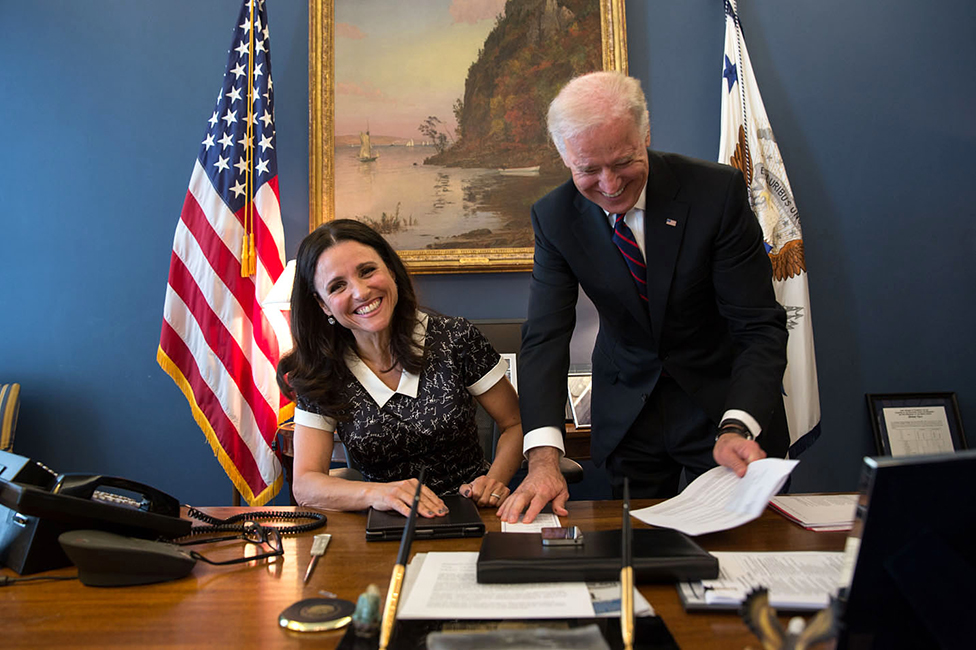
With the June finale of Veep‘s second season fast approaching, Iannucci and his creative team—which includes Simon Blackwell and Sean Gray—have their sights set on season three, which has already gotten the greenlight from HBO for a ten-episode run in 2014. While the first two seasons focused primarily on the White House, the VP’s office, and Washington, Iannucci says that fans of the show ought to prepare to spend more time outside of the nation’s capital in the third season. Without giving too much away, he says the new direction will include closer examination of “external powers” like state political machines, lobbying organizations, tech gurus, and other key “influence makers.”
“[Vice President Selina Meyer] is reaching that stage in her career where she wants to put distance between herself and the president,” Iannucci says. “The next season will be about her distinguishing herself from him.”
Whenever he begins mapping out a new season, Iannucci finds nuggets of inspiration in the news (for example, a season-two subplot involves a political standoff that mirrors the debt-ceiling fight). As a keen observer of American politics, he does not, however, binge on the play-by-play of the 24-hour news cycle. “I don’t read or watch everything [on cable news] because I think you’d just go crazy from doing that,” he remarks. “I prefer zeroing in on the details of a couple of things. I find that much more illuminating than watching a big, big story unfold on the news networks. We’re all seeing that—I want to know what’s happening behind the scenes.” Recently, Iannucci zeroed in on the debates over US immigration reform, and “the gun control thing.” The failure of the Manchin-Toomey background check bill in the Senate was both an educational and troubling moment for Iannucci to behold. “There was this horrific event followed up by a ground swell of support,” Iannucci recalls. “And then it was an example of how easily power and special interests can chip away at individual voices. Coming from [a perspective of] UK politics where that system of lobbying isn’t quite as pronounced…I found it eye-opening to see something like that.”
When asked about his own political views, Iannucci classifies himself as left-of-center, and says that “in America, I’d be considered more [of a] Democrat.” But advocacy isn’t his game; he’s a consummately equal-opportunity satirist—and it shows. “The last thing I want to do is use my comedy as a partisan tool, or as a method for preaching,” Iannucci insists. “What I want to do is show what the system can do to you, and to have [the audience] sympathize with the terrible set of circumstances these characters have to deal with every single day.”
And that’s the kind of thoughtfulness Armando Iannucci pumps into his unique variety of uproarious, expletive-encrusted television.
Check out his extended interview on The Daily Show from an episode last Tuesday:
Click here for more movie and TV coverage from Mother Jones.
To read Asawin’s reviews, click here.
To listen to the movie and pop-culture podcast that Asawin cohosts with ThinkProgress critic Alyssa Rosenberg, click here.

